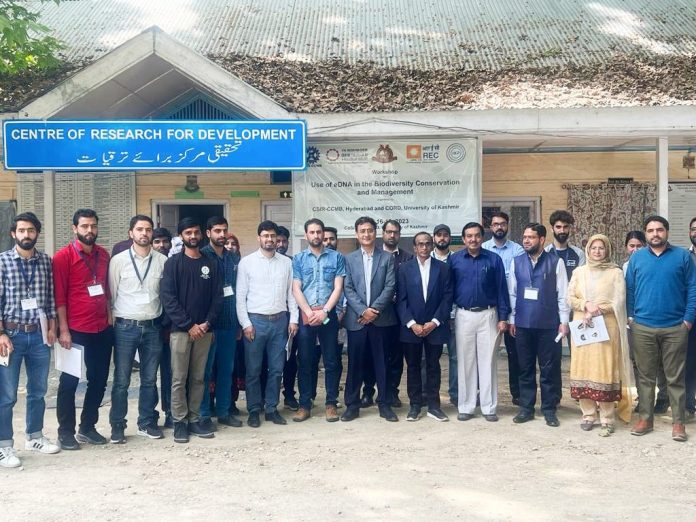SRINAGAR: At least 22 young researchers are being trained at the University of Kashmir in biodiversity conservation and management using eDNA.
The training is being imparted during a three-day workshop organised by Centre of Research for Development (CORD), University of Kashmir, in collaboration with Atal Incubation Center (AIC-CCMB), Laboratory for the Conservation of Endangered Species (LaCONES-CCMB), IKP Knowledge Park Hyderabad, and RECL Jammu in the newly-established Conservation Science and Innovation Laboratory (CoSI Lab) at the CORD.
The workshop will cover the theoretical and practical aspects of eDNA isolation, single-species detection using qPCR and multi-species detection using next-generation sequencing from different types of environmental samples such as soil, water, and air, the organisers said.
Rashid Y Naqash, Regional Wildlife Warden Kashmir division, Department of Wildlife Protection, J&K, graced the inaugural function as chief guest.
In his opening remarks, Dr G Umapathy, Senior Principal Scientist, LaCONES, CCMB gave the introduction about the aim and scope of the workshop, while Prof Md. Niamat Ali, Director CORD and convenor of the workshop, welcomed the participants and the resource persons.
The workshop is being conducted by three expert members from LaCONES, CCMB including Dr G Umapathy, S. Manu, and Gopi Krishnan.
A total of 22 shortlisted candidates including senior PhD students, research scholars, post-doctoral fellows, young scientists and assistant professors from University of Kashmir, Sher-e-Kashmir University of Agricultural Sciences and Technology, Islamia College of Science and Commerce, wildlife veterinarians from Wildlife department, Jammu and Kashmir are participating in the workshop.
The workshop will underline the importance of biodiversity assessment and monitoring using eDNA, various tools and methods used in eDNA analysis, eDNA sampling methods, preservation procedures, sequencing and computational analysis.
It will help bring awareness and train different stakeholders on the latest eDNA-based technology for biodiversity conservation and management of Jammu and Kashmir.
Citing an example, the organisers said this technology will help to easily map the distribution and diversity of various species, including endangered and rare species in aquatic and terrestrial ecosystems of Jammu and Kashmir using water, sediment and soil samples without the need for direct observation or capture of animals. It will also help to identify all the alien invasive species in these ecosystems that are negatively affecting the native flora and fauna of Jammu and Kashmir. This technology can also be adapted for biomonitoring and disease surveillance of migratory birds that use the wetland ecosystems of the UT as wintering grounds.
The participants will gain hands-on experience in eDNA isolation, qPCR, and metabarcoding and learn how to optimise these techniques for different types of environmental samples.


